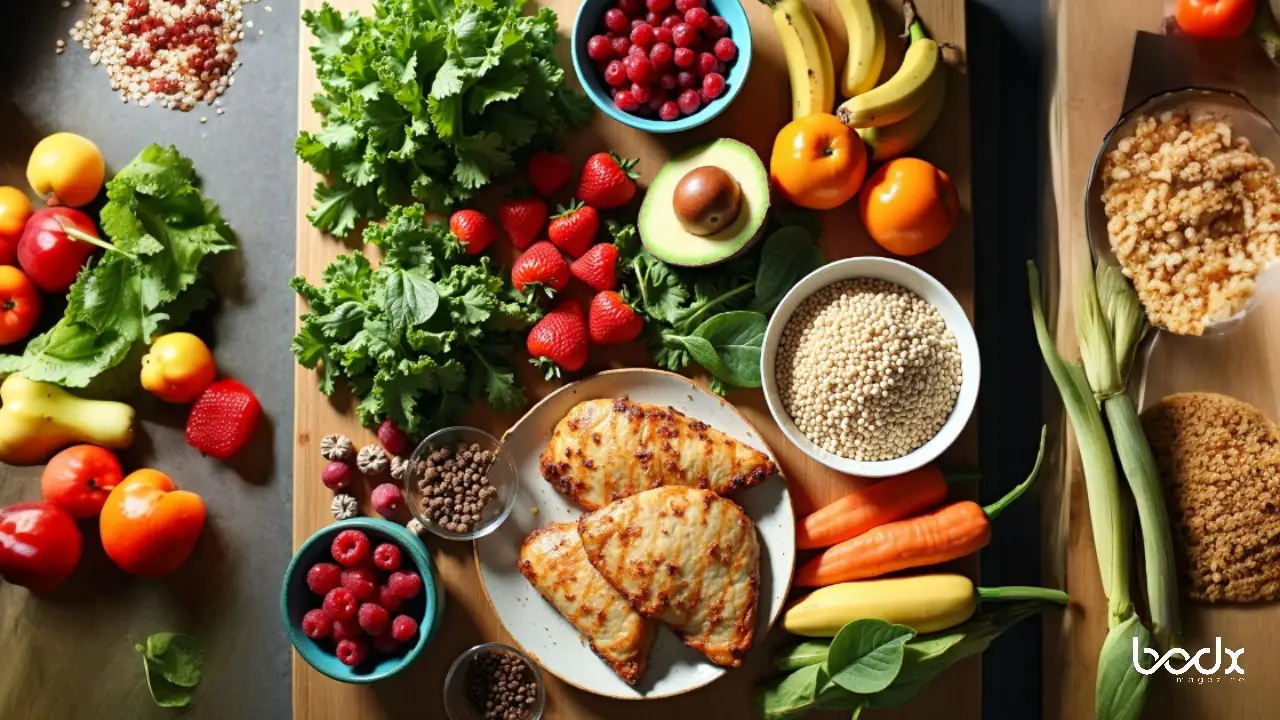Introduction
In today’s fast-paced world, maintaining a balanced diet is more crucial than ever. Holistic nutrition offers a comprehensive approach to health, focusing on the whole person rather than just individual symptoms. This article delves into the principles of holistic nutrition, providing practical tips and insights to help you craft a balanced diet for better health.
Understanding Holistic Nutrition
What is Holistic Nutrition?
Holistic nutrition is an approach that considers the whole person—mind, body, and spirit. It emphasizes the importance of natural, unprocessed foods and the balance of nutrients to promote overall well-being. Unlike conventional nutrition, which often focuses on calorie counting and specific nutrients, holistic nutrition looks at the broader picture, including lifestyle, emotional health, and environmental factors.
The Principles of Holistic Nutrition
- Whole Foods: Emphasizing natural, unprocessed foods.
- Balance: Ensuring a balance of macronutrients (proteins, fats, carbohydrates) and micronutrients (vitamins, minerals).
- Individualization: Tailoring the diet to individual needs and preferences.
- Mindful Eating: Encouraging awareness and appreciation of food.
- Sustainability: Considering the environmental impact of food choices.
The Benefits of a Holistic Diet
Physical Health
A holistic diet can lead to numerous physical health benefits, including:
- Improved Digestion: Whole foods are rich in fiber, aiding digestion and preventing constipation.
- Enhanced Immunity: Nutrient-dense foods boost the immune system, helping to ward off illnesses.
- Weight Management: Balanced nutrition helps maintain a healthy weight without the need for restrictive diets.
Mental and Emotional Well-being
Holistic nutrition also supports mental and emotional health:
- Reduced Stress: Nutrient-rich foods can help manage stress levels.
- Better Mood: Certain foods, like those rich in omega-3 fatty acids, can improve mood and reduce symptoms of depression.
- Increased Energy: A balanced diet provides sustained energy throughout the day.
Crafting a Balanced Holistic Diet
Incorporating Whole Foods
Whole foods are the cornerstone of a holistic diet. These include:
- Fruits and Vegetables: Aim for a variety of colors to ensure a range of nutrients.
- Whole Grains: Choose grains like quinoa, brown rice, and oats over refined grains.
- Lean Proteins: Include sources like fish, poultry, beans, and legumes.
- Healthy Fats: Opt for fats from avocados, nuts, seeds, and olive oil.
Balancing Macronutrients
A balanced diet includes the right proportions of macronutrients:
- Proteins: Essential for muscle repair and growth. Include a variety of animal and plant-based proteins.
- Carbohydrates: The body’s primary energy source. Focus on complex carbs like whole grains and vegetables.
- Fats: Necessary for hormone production and brain health. Prioritize unsaturated fats over saturated and trans fats.
Micronutrients Matter
Micronutrients, though needed in smaller amounts, are vital for health:
- Vitamins: Ensure adequate intake of vitamins A, C, D, E, and the B-complex vitamins.
- Minerals: Include minerals like calcium, magnesium, potassium, and iron in your diet.
Hydration is Key
Proper hydration is often overlooked but is crucial for overall health. Aim to drink at least 8 glasses of water a day, and more if you are physically active.
Mindful Eating Practices
Listen to Your Body
Mindful eating involves paying attention to your body’s hunger and fullness cues. Eat when you are hungry and stop when you are satisfied, not stuffed.
Savor Your Food
Take time to enjoy your meals. Chew slowly and appreciate the flavors and textures of your food. This not only enhances digestion but also increases satisfaction.
Avoid Distractions
Eating in front of the TV or while working can lead to overeating. Focus on your meal to fully enjoy and recognize when you are full.
Holistic Nutrition and Lifestyle
Physical Activity
Regular physical activity complements a holistic diet. Aim for at least 30 minutes of moderate exercise most days of the week. This can include walking, yoga, swimming, or any activity you enjoy.
Stress Management
Chronic stress can negatively impact your health. Incorporate stress-reducing practices like meditation, deep breathing exercises, and hobbies that you enjoy.
Quality Sleep
Adequate sleep is essential for overall health. Aim for 7-9 hours of quality sleep each night. Establish a regular sleep routine and create a restful environment.
Common Myths About Holistic Nutrition
Myth 1: Holistic Nutrition is Expensive
While some organic and specialty foods can be costly, holistic nutrition does not have to break the bank. Focus on seasonal produce, bulk grains, and local markets to keep costs down.
Myth 2: It’s Too Time-Consuming
Preparing whole foods can be time-consuming, but with proper planning, it can fit into a busy schedule. Batch cooking, meal prepping, and simple recipes can save time.
Myth 3: It’s Only for Health Enthusiasts
Holistic nutrition is for everyone, not just health enthusiasts. It promotes overall well-being and can be adapted to suit any lifestyle or dietary preference.
Conclusion
Holistic nutrition offers a comprehensive approach to health, focusing on the whole person rather than just individual symptoms. By incorporating whole foods, balancing macronutrients, and practicing mindful eating, you can craft a balanced diet that supports both physical and mental well-being. Remember, holistic nutrition is not about perfection but about making sustainable, healthy choices that enhance your overall quality of life.
FAQs
1. What is the difference between holistic nutrition and conventional nutrition?
Holistic nutrition considers the whole person, including lifestyle and emotional health, while conventional nutrition often focuses on specific nutrients and calorie counting.
2. Can holistic nutrition help with chronic diseases?
Yes, a holistic diet can support the management and prevention of chronic diseases by promoting overall health and reducing inflammation.
3. Is it necessary to eat organic foods in a holistic diet?
While organic foods can reduce exposure to pesticides, they are not mandatory. Focus on whole, unprocessed foods, whether organic or not.
4. How can I start incorporating holistic nutrition into my diet?
Begin by adding more whole foods, reducing processed foods, and practicing mindful eating. Gradually make changes that fit your lifestyle.
5. Can children benefit from a holistic diet?
Absolutely. A holistic diet can support children’s growth, development, and overall health.
6. Are there any risks associated with holistic nutrition?
Holistic nutrition is generally safe, but it’s important to ensure a balanced intake of all nutrients. Consult a healthcare professional if you have specific health concerns.
7. How does holistic nutrition impact mental health?
A balanced diet rich in nutrients can improve mood, reduce stress, and support overall mental well-being.
8. What role does hydration play in holistic nutrition?
Hydration is crucial for overall health, aiding in digestion, nutrient absorption, and maintaining energy levels.
9. Can holistic nutrition help with weight loss?
Yes, by promoting a balanced diet and mindful eating, holistic nutrition can support healthy weight management.
10. How can I maintain a holistic diet while traveling?
Plan ahead by packing healthy snacks, choosing whole foods, and staying hydrated. Look for local markets and restaurants that offer nutritious options.


















